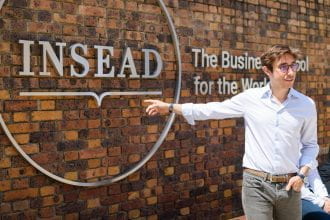As Managing Director of Plaxall Inc., Paula Kirby is focused on developing a new kind of waterfront community in New York City
Working in the fashion industry was a dream come true for Paula Kirby MBA’94J. She studied art history and Italian with the hope of one day joining a major fashion house. But it was her INSEAD MBA that helped her land her dream job as Head of Marketing for Prada in Milan. “I didn’t think life could get any better,” she remembers.
For the next 20 years, Kirby took that passion and ran with it: serving as Deputy Director of Prada UK, Global Licensing Executive for Alfred Dunhill in London and Global Senior Director for Calvin Klein Eyewear in New York.

Kirby was unsure whether to accept the offer. “A family business is not just a nine-to-five job; it is 24/7 as you’re always representing the family and the business, and it inevitably affects family relationships,” she says.
To help her make the decision, she sought out the advice of Randel Carlock, Senior Affiliate Professor of Entrepreneurship and Family Enterprise, while attending her 20th reunion with her husband Peter McWhinnie MBA’94J. Throughout their careers, INSEAD’s network had always been an amazing resource to tap into wherever they were in the world, and this time was no different, she says.
“[Professor Carlock] said, ‘You’ve got the capability. You need to put any concerns you have behind you and jump in with both feet,” Kirby remembers.
He encouraged her to view it as an opportunity to help take Plaxall to the next level, giving Kirby the confidence to join the company as Managing Director.
Today, Kirby is part of a third-generation team of family members that runs the manufacturing business and manages over one million square feet of commercial real estate. Plaxall owns 12.6 acres of waterfront property in Long Island City, an area just one subway stop from Grand Central Station.
“You look out across the East River to the United Nations, the Chrysler Building, the Empire State Building—it’s one of the most beautiful views in the world,” she says. “It’s a neighbourhood that has been evolving organically over the years and is full of many possibilities for development.”
Wanting to invest in the neighbourhood’s future, Plaxall launched the Anable Basin project, a rezoning and development plan to open a closed-off waterfront inlet to the public and create a vibrant mixed-use community. The project aims to retain the character of the neighbourhood, which is currently a mix of light industrial tenants, tech start-ups, artist workspaces and—the secret sauce—microbreweries. It will create space for retail, manufacturing, community uses and housing—25 percent of which will be affordable.

“It’s an incredible opportunity to do something transformational,” says Kirby. “We’re hoping to create a live/work/play hub, which we think is the way of the future. People will live closer to where they work, so they can walk or bike—it’s a more sustainable path for the city.”
The proposal is going through the planning process, and if approved, work could begin by 2020. The 15-year phased plan includes an elevated esplanade to promote flood resiliency and 3.1 acres of public waterfront access. Plaxall will also gift the city a site for a 700-seat public school.
The project is inspired by the family’s commitment to the neighbourhood. For three generations, they’ve supported local non-profits and served on boards of civic and cultural institutions. They want to use their business as a force for good in the community by creating a lasting legacy for the area.
“Our family history here shaped how we approached this project, because we want it to be something that will benefit the community,” she says.
“I am very proud to be part of this initiative and to see what comes to fruition from our grandfather’s vision. I’m grateful INSEAD was able to give me the confidence to tackle this.”


